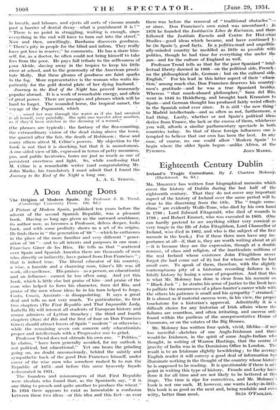A Don Among Dons
The Origins of Modern Spain. By Professor J. B. Trend. (Cambridge University Press. 10s. 6d.) A Picture of Modern Spain, published ten years before the advent of the second Spanish Republic, was a pleasant book. Having so long ago given us the outward semblance, its author now, as becomes a Professor, delves deeper, looks back, and with some prolixity shows us a set of its origins. He finds them in " the generation of '68 "—which he enthrones in the place of the more familiar and very different " gener- ation of '98 "—and to all intents and purposes in one man : Francisco Giner de los Rios. He tells us that " scattered over Spain and Spanish America there are thousands of men who, directly or indirectly, have gained from Don Francisco ".; , that is indeed true. The- liberal educator of his country, a wise, a humble and a charming man, Giner's life was all work, all excellence. His praises—as a person, an educationist and an influence—cannot be too often sung. And yet this book, which is little else but praise of him—and praise of the man who helped to form his character, Sanz del Rio, and praise of the men whose ideas he in his turn helped to forge, Costa, Cossio, Azcarate—is disappointing. It says a great deal and tells us not very much. To particularize, its first two chapters (The First Republic and That Impossible Lady, Isabella II) will interest all students of European history and amuse admirers of Lytton Strachey ; the third and fourth chapters (Sanz del Rio and the first of four on Don Francisco Giner) should attract lovers of Spain " modern " or otherwise ; while the remaining seven can concern only educationists proper and intellectuals with a Progressive axe to grind.
Professor Trend does not obtrude his own axe. " Politics," he claims, " have been generally avoided, for my outlook is not political, but educational." Yet one hears the grinding going on, no dOubt unconsciously, behind the saintly and sympathetic back of the good Don Francisco himself, under cover of the wise men who somehow rushed in to run the Republic of 1873—and before this same heavenly façade redecorated in 1931.
The founders and mismanagers of that First Republic were idealists who found that, as the Spaniards say, " it is one thing to preach and quite another to produce the wheat." In 1934 there appears to exist as lamentable a confusion between these two ideas—or this idea and this fact—as ever
there was before the removal of " traditional obstacles "— or since. Don Francisco's own mind was unconfused ; 1876 he founded the Institucion Libre de Esehanza, and there followed the Institute Eicuela and Centre for Historicist Studies—good ideas which became, and have continued to be (in Spain !), good facts. In a politics-mad and unpolitic- ally-minded country he meddled as little as possible with politics, though he had time for everything else under the sun—and for the culture of England as well.
Professor Trend tells us that for the pOor Spaniard " intel- lectual liberty dawned in 1868on the political side, French ; . on the philosophical side, Gennan ; but on the cultural side, English." For his lead in this latter aspect of their educa- tion,' among much else, Don Francisco deserves his countcy- men's gratitude—and he was a true Spaniard besidqs. Whereas " that much-abused philosopher," Sanz del Rio, went in 1843 to Heidelberg, and brought back Krausism to Spain—and German thOught has produced fairly weird effects in the Spanish mind ever since. It is still ' the new thing' to Madrid intellectuals—and as often as not, furthermore, a bad thing. Lastly, whether or not Spain's political ideas derive from France, the lack or the excess of them, whichever you will, affords a similar parliamentary spectacle in both countries today. So that of these foreign influences one is . tempted to believe that our own has been the best. In any _ case, of course, no one could allow ' Modern Spain ' to begin where the older Spain began—unlike Africa, at the




































 Previous page
Previous page